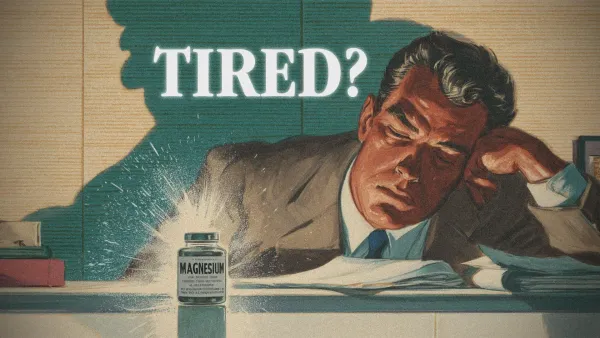Ashwagandha 101: The Complete Guide to Benefits, Dosage, Safety & Best Time to Take

Ashwagandha isn’t new. It’s one of the most ancient herbs in traditional Ayurvedic medicine — used for over 3,000 years to boost energy, calm the nervous system, and promote overall balance. So why is everyone suddenly talking about it now?
Two words: chronic stress.
We live in a world of relentless inputs — deadlines, blue light, blood sugar swings, caffeine overdoses, dopamine loops. The modern nervous system is constantly overstimulated. And people are burned out — physically, mentally, emotionally.
Ashwagandha offers something different: calm energy. Not the wired buzz of a nootropic, not the numb sedation of a sleep aid — but a deeper recalibration of how your system responds to stress. It's subtle. But it stacks up. And that's why it's becoming the go-to adaptogen for a new generation of biohackers, wellness seekers, and performance-minded people.
What’s more — clinical data is catching up with the hype. Recent studies confirm what ancient medicine has claimed for centuries. But with that popularity comes confusion, hype, and low-quality products flooding the market. This guide will help you cut through the noise.
What Is Ashwagandha, Really? A Breakdown That Isn’t Fluff
Ashwagandha (Withania somnifera) is classified as an adaptogen — a natural compound that helps the body adapt to physical and psychological stress. But unlike stimulants or sedatives, it works more subtly, by modulating systems over time. Think of it not as a “quick fix” but a nervous system conditioner.
Botanically, it’s a small shrub with yellow flowers, native to India and North Africa. Its roots and berries are the active parts — rich in compounds called withanolides, which are believed to be responsible for most of its effects.
The most notable benefits include:
- Lowering cortisol levels (your primary stress hormone)
- Improving sleep quality and reducing anxiety
- Supporting thyroid function
- Enhancing physical strength and endurance
- Possibly improving testosterone levels and sperm quality in men
Mechanistically, it seems to regulate the HPA axis — the system that governs your stress response. Instead of “boosting” or “calming” everything, it brings things closer to baseline. Less chaos. More resilience.
Ashwagandha doesn’t just suppress symptoms — it trains your system to handle pressure better over time. That’s why it’s often taken long-term, rather than in acute doses like caffeine or melatonin.
What Ashwagandha Can (and Can’t) Do for You
Ashwagandha has been marketed as everything from a stress reliever to a testosterone booster and even a muscle builder. But let’s cut through the noise.
✅ Backed by Research
Here’s where science actually backs up the hype — at least partially:
- Cortisol Reduction: Multiple human studies show a consistent effect — daily Ashwagandha can reduce cortisol by up to 30%. That’s real, and it matters for stress resilience, belly fat, and mood.
- Anxiety & Sleep: Randomized controlled trials (RCTs) show reduced anxiety scores (especially in GAD and mild stress disorders), and improved sleep latency + quality. Not as strong as benzos — but not addictive either.
- Physical Strength: Some data supports strength and endurance gains in untrained individuals. Doses of 600 mg/day of KSM-66 extract led to improved VO₂ max, grip strength, and recovery.
- Male Hormonal Health: In men with low fertility or suboptimal testosterone, Ashwagandha has shown moderate increases in T levels, sperm quality, and motility.
⚠️ Overhyped or Not Proven
- Nootropic Effects: Claims about sharper focus and memory come mostly from rodent studies. Human evidence is inconsistent. May help indirectly by reducing stress and improving sleep, but it’s not a substitute for a real nootropic.
- Muscle Growth for Athletes: Some studies show mild benefits, but effects seem limited unless you're starting from a low baseline or under high stress.
- Thyroid Support: Early evidence suggests it may support thyroid function in people with subclinical hypothyroidism, but this should never replace medical treatment.
- Immunity Booster? Meh. Some animal studies suggest immunomodulatory effects, but there’s no strong clinical evidence for cold prevention or immune defense.
🧠 Bottom line:
Ashwagandha is a stress-adaptation tool — not a magic pill. It works best for people under chronic stress, poor sleep, or hormonal imbalance. If you’re already optimized, you may not feel much.
When Is the Best Time to Take Ashwagandha?
Timing matters — especially when you're using adaptogens like ashwagandha to fine-tune your stress response, energy levels, and sleep quality.
☀️ Morning vs. 🌙 Evening: What's the Difference?
Ashwagandha works cumulatively, not like caffeine or melatonin. But depending on your goals, the timing can shift slightly:
- Take it in the morning if you want:
- Support for focus and mood throughout the day
- A buffer against work-related stress or social anxiety
- A gentle alternative to stimulants
- Take it in the evening if you’re:
- Struggling with sleep, cortisol spikes at night, or anxious thoughts before bed
- Using it to unwind, relax your nervous system, or recover from intense training
Some people split their dose: morning + evening for steady benefits.
🧪 What the science says:
While there’s no universal “best time,” studies on sleep and cortisol often administer ashwagandha in the evening. For example:
- A 2019 study showed significant improvements in sleep quality when participants took 300 mg of ashwagandha extract twice daily, including once before bed.
- Cortisol tends to be higher in the morning — but for some, it's the evening spikes that cause the most issues. Evening dosing can blunt those spikes.
🧠 Biohacker Insight:
- Trying to replace coffee or reduce caffeine? Try morning ashwagandha with L-theanine or Rhodiola.
- Trying to fix your sleep? Evening is your best bet — maybe stacked with magnesium or glycine.
Is Ashwagandha Bad for Your Liver?
This question pops up often — and for good reason. The liver is your body’s chemical filter. And anything you take regularly (especially herbs and supplements) should pass the safety test.
🧪 What the Science Says
- In most cases, Ashwagandha is not toxic to the liver.
Clinical trials using standardized extracts (KSM-66, Sensoril) in healthy adults show no signs of liver damage — even at higher doses (600–1000 mg/day) for up to 12 weeks. - Liver enzyme levels (ALT, AST, etc.) remain stable in these studies. No major red flags, no abnormal biomarkers.
- Animal studies at much higher doses (relative to body weight) also show minimal hepatotoxicity — unless the herb is contaminated or poorly extracted.
⚠️ But here’s the nuance:
- There have been a handful of case reports of liver injury linked to Ashwagandha — specifically in India, Japan, and the U.S. These are extremely rare and usually resolve after stopping the supplement.
- In many of these cases:
- The extract source was unclear or non-standardized.
- The patients took other medications or herbs at the same time.
- Some had underlying liver issues.
🧼 What to Look Out For
- Avoid cheap, unverified brands — especially if they don’t disclose extraction method or withanolide content.
- Always choose standardized extracts (like KSM-66 or Sensoril).
- If you already have liver disease or elevated liver enzymes, consult a doctor before using.
🧠 Bottom line:
For healthy individuals using high-quality Ashwagandha, the risk of liver damage is extremely low. But if you feel unusual fatigue, dark urine, or upper right abdominal pain — stop immediately and get checked.
Can You Take Ashwagandha If You Have High Blood Pressure?
This is a common concern — and a smart one. When you’re dealing with blood pressure issues, even natural supplements can have real effects.
🧠 The Basics
Ashwagandha is best known for its adaptogenic properties — meaning it helps the body manage stress. Since stress is one of the key drivers of hypertension, it makes sense that ashwagandha might be helpful here.
🔬 What the Research Shows
Several studies suggest that ashwagandha may slightly reduce blood pressure in people with elevated stress or mild hypertension.
- In a 2012 randomized trial, participants taking 300 mg of ashwagandha root extract twice daily showed a significant reduction in both systolic and diastolic BP after 12 weeks.
- Other small-scale studies echo this trend — modest improvements, likely due to cortisol regulation, better sleep, and a calming effect on the nervous system.
But let’s be clear:
🩺 Ashwagandha is not a blood pressure medication. It’s a supportive tool — not a replacement.
⚠️ Important Considerations
- If you’re already taking antihypertensive drugs (like beta blockers or ACE inhibitors), combining them with ashwagandha could potentially lower your BP too much.
- If you have severely uncontrolled hypertension, it’s best to avoid adding anything new without medical supervision.
🧠 Bottom line:
Ashwagandha can be safe — and even beneficial — for people with mild to moderate high blood pressure, especially when stress is a factor. But always check with a doctor before mixing it with prescription meds.
How to Choose a High-Quality Ashwagandha Supplement?
Not all ashwagandha supplements are created equal. The quality, potency, and even the effects can vary dramatically depending on the form, extraction method, and standardization. If you're aiming for real benefits — not placebo — here's what to look for.
✅ Standardized Extracts Matter
Raw root powder isn't the same as a concentrated extract. Look for supplements that are standardized to contain a specific percentage of withanolides — the key active compounds in ashwagandha.
- KSM-66 is a full-spectrum root extract standardized to 5% withanolides. It's known for enhancing physical performance, reducing stress, and improving testosterone levels.
- Sensoril is a leaf-and-root extract standardized to 10% withanolides. It's more calming and sedative — better suited for anxiety and sleep.
Both are clinically studied. Choose based on your goal:
- Need energy, endurance, hormonal support? Go with KSM-66.
- Need calm, sleep, anti-anxiety support? Go with Sensoril.
⚠️ Skip the “proprietary blends”
Some cheap supplements hide the dosage behind "proprietary formulas." That’s a red flag. You want to know exactly how many milligrams of ashwagandha you’re getting — and how potent it is.
A typical clinical dose ranges from 300 mg to 600 mg of standardized extract, taken once or twice a day.
🔍 Check for third-party testing
Supplements should be tested for purity, heavy metals, and contaminants — especially with herbal products. Look for brands that mention third-party certification, like NSF, USP, or Informed-Sport.
🌱 Root-only vs root + leaf
Ayurvedic tradition uses mostly the root. Some modern extracts include leaf — which may increase withanolide content, but the long-term safety of leaf extracts is less studied. If you want to stick with traditional usage, choose root-only extracts.
🧠 Bottom line:
Don’t fall for fancy branding or unverified claims. The best ashwagandha supplements are standardized, transparent, and clinically dosed. Know what you're putting in your body — and why.
Recommended Ashwagandha Supplements from Trusted Brands
Based on the criteria we’ve covered — standardized extracts, root-only formulations, clear withanolide content, and third-party testing — here are a few top picks to consider:
- Thorne Stress Balance (KSM-66® Root Extract, 150 mg)
Complete anti-stress complex. A clean, pharmaceutical-grade formula with 5% withanolides. Thorne’s commitment to purity and rigorous testing makes this a solid daily staple. - Gaia Herbs Ashwagandha Root (Sensoril®, 350 mg)
Combines root and leaf for a higher withanolide profile (10%). Ideal if you’re focused on stress relief and improved sleep. - Life Extension Optimized Ashwagandha (Sensoril®, 125 mg)
Standardized extract of Withania somnifera, great for those under heavy stress or athletic training. Non-GMO and vegan-friendly. - NOW Foods Ashwagandha Extract (Withanolide-standardized, 450 mg)
An affordable option with third-party testing. Look for the 5% withanolide version to ensure potency. - Himalaya Organic Ashwagandha (Root Powder, 660 mg)
A traditional, full-spectrum powder — best if you prefer a more holistic preparation, though it may require a higher dose to match extract potency.
Tip: Start with one brand at your target dose for 4–6 weeks, then reassess. Track your sleep, stress levels, and any side effects, and adjust as needed. Always verify you’re getting a standardized extract (KSM-66® or Sensoril®) and avoid proprietary blends without clear labeling.
Conclusion: Your Ashwagandha Cheat-Sheet
Ashwagandha has earned its reputation as one of the most versatile adaptogens available today—but only if you use it wisely. Here’s the bottom line:
- What it is
A time-tested Ayurvedic herb (Withania somnifera) whose active withanolides help your HPA-axis adapt to stress, balance cortisol, and support recovery. - Key benefits
• Proven cortisol reduction (–20–30%)
• Better sleep quality and lower anxiety scores
• Modest gains in strength, endurance, and male hormone balance - Safety & Side Effects
• Extremely low risk of liver toxicity at 300–600 mg/day of a standardized extract
• Mild hypotensive effect can help—yet also amplify—blood-pressure meds
• Rare GI upset or headache; use with caution in pregnancy, autoimmunity, or thyroid disorders - Timing & Dosing
• Morning for daytime stress resilience and focus
• Evening to wind down and improve sleep
• Split doses (e.g. 300 mg AM + 300 mg PM) often work best - Choosing Your Supplement
• Opt for root-only standardized extracts (KSM-66®, Sensoril®)
• Avoid proprietary blends—look for clear withanolide percentages
• Seek third-party testing (NSF, USP, Informed-Sport)
Who should try it?
Anyone under chronic stress, battling sleep issues, or seeking hormonal balance in a high-pressure lifestyle.
Who should pause?
Pregnant or breastfeeding women, those on heavy immunomodulators, or anyone with uncontrolled blood pressure—always consult your doctor first.
Ashwagandha isn’t a magic pill, but as a consistent, intelligently dosed habit, it can be a cornerstone of your biohabit toolkit. Ready to give it a try? Pack your regimen with purpose—and let your nervous system do the rest.




